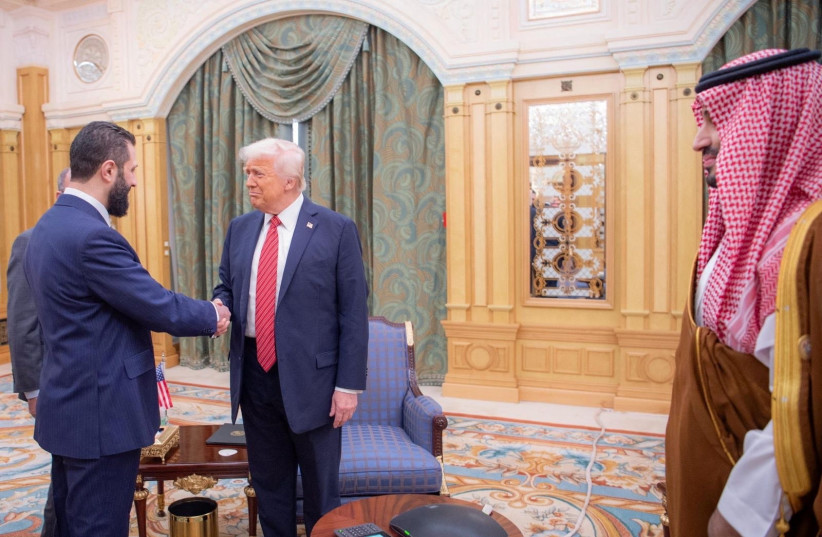In a region long shaped by inertia, conflict, and sanctions, the May 14th meeting between U.S. President Donald Trump and Syria’s transitional president Ahmad al-Sharaa in Riyadh marks a dramatic inflection point. Celebrated by some as a historic diplomatic breakthrough and condemned by others as an expedient whitewashing of past violence, the encounter encapsulates a broader shift in the global order — one where realpolitik triumphs over memory, and power recalibrates eastward.
This was the first meeting between a U.S. and Syrian president in 25 years, and it came just one day after Trump’s surprise announcement that he would lift all U.S. sanctions on Syria. The decision — lauded by Saudi Arabia’s Crown Prince Mohammed bin Salman and welcomed by Turkey’s President Recep Tayyip Erdoğan — has sent shockwaves across diplomatic and policy circles, signaling a complete reconfiguration of U.S. priorities in the Middle East.
From “Terrorist” to “Young, Attractive Guy”: Sharaa’s Image Reinvented
Just months ago, Ahmad al-Sharaa was still listed as a designated terrorist by the U.S. government due to his past affiliations with al-Qaeda and Hay’at Tahrir al-Sham. He led the military campaign that ousted Bashar al-Assad in December 2024. Today, Trump describes him not as a former jihadist but as a “young, attractive guy — tough guy” with “a real shot” at rebuilding Syria. The rhetorical pivot is stunning, not only for its immediacy but also for its implications: Washington is prepared to erase the past in service of strategic recalibration.
Arabic-language coverage underscores this transformation with more formality. Syrian officials emphasized Sharaa’s commitment to the 1974 disengagement agreement with Israel, his desire to expel all “foreign terrorist elements,” and his invitation to American companies to invest in Syrian oil and gas. These talking points signal a clear attempt to rebrand the Syrian leadership as pragmatic, post-ideological, and investment-ready.
The Strategic Ask: Israel, Iran, and Terrorism
Trump’s demands were explicit: normalize relations with Israel, sign the Abraham Accords, oversee the detention centers in northeast Syria, and deport Palestinian militants — notably from groups like Hamas and Islamic Jihad, long hosted by Damascus under Assad. For decades, Syria’s capital was a nexus for anti-Israel resistance movements. Now, the script has flipped.
What stands out in the English reporting — especially from NPR and The Independent — is the frankness of the American ask, including the push for a post-Iran Syria. Sharaa, in turn, affirmed that the withdrawal of Iranian forces had created a historic opportunity. He acknowledged “shared interests” with Washington in combating terrorism and eliminating chemical weapons.
Yet, for all the performative unity, tensions lurk. While Israel reportedly remains cautious of Sharaa’s past, it has signaled conditional openness, particularly if Syria reins in Sunni factions near the Golan and contains the remnants of Hezbollah and Iranian militias.
Multipolar Realities and the Death of “Nation-Building”
The symbolism of the photo — Trump, Sharaa, and Mohammed bin Salman seated together — was not lost on The Jerusalem Post, which called it a representation of a “new world order.” The article argues that the meeting marks the end of the U.S.-led Global War on Terror, a two-decade arc from Bush’s 2001 invasion of Afghanistan to today’s deal-making with former insurgents-turned-statesmen.
Trump’s message was clear: America is no longer in the business of lecturing. He ridiculed the failures of “nation-builders” in Iraq and Afghanistan, contrasting them with the supposed organic development of Gulf prosperity. In that sense, his policy represents a radical departure from liberal interventionism — one that aligns more closely with China and Russia’s non-ideological, transactional foreign policy model.
Regional and Global Reverberations
Reactions have been swift and polarized. In Damascus and other regime-held areas, public celebrations broke out, with pro-government media casting the meeting as the end of Syria’s isolation. Gulf states expressed eagerness to invest, particularly in oil, gas, and reconstruction infrastructure. Erdoğan and bin Salman praised Trump’s “bravery” in lifting the sanctions.
But the English-language media highlighted risks. There are concerns that Sharaa may continue to rule through coercion. Minority fears remain acute, and although Sharaa has met with Mazloum Abdi of the Syrian Democratic Forces, integration of Kurdish regions into the new national framework is far from guaranteed. Questions also linger over transitional justice, accountability, and inclusivity — words curiously absent from both Trump’s and Sharaa’s public remarks.
A Pivot to Power, Not Principle
The Trump–Sharaa meeting is a powerful emblem of how quickly narratives can change when strategic interests align. What was once a pariah regime is now a prospective partner. What was once a terrorist is now a “reformer.” The U.S. is pivoting away from idealism toward transactional realism, setting the stage for a Middle East defined less by Western liberal norms and more by negotiated spheres of influence.
It is too early to tell whether this will bring genuine stability or merely recycle authoritarianism in new attire. What is certain is that the meeting in Riyadh will be remembered as the moment when Syria’s frozen conflict entered a new — and deeply ambiguous — chapter.


